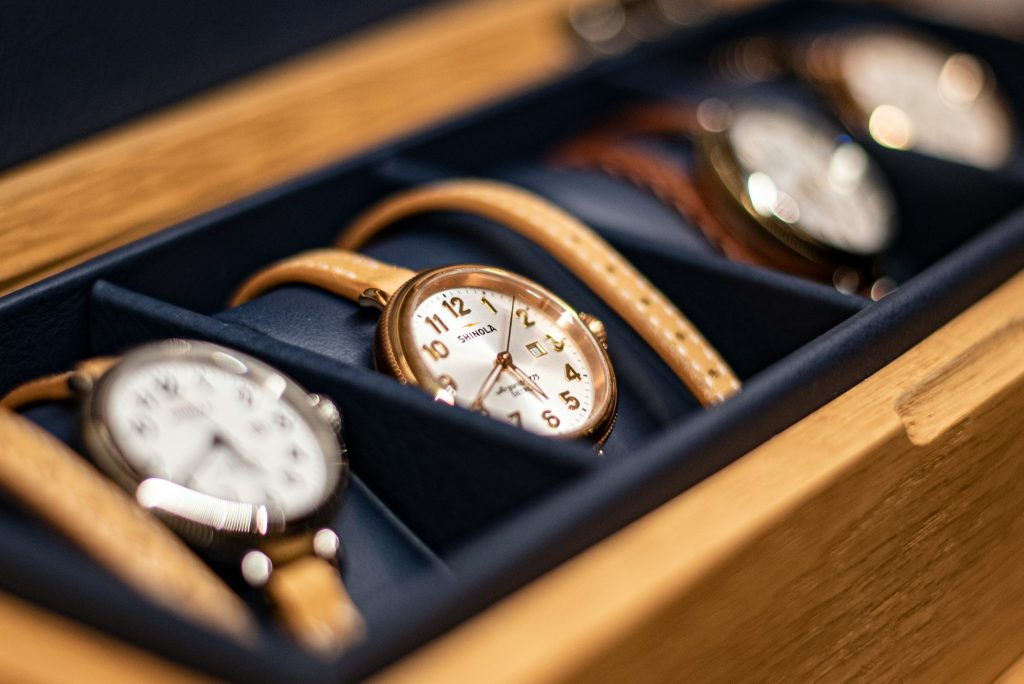Blog
How to Care for Your Watch: Maintenance Tips for Longevity
How to Care for Your Watch: Maintenance Tips for Longevity
A luxury watch is not only a tool for telling time; it’s an investment in craftsmanship, precision, and style. Whether it’s a high-end mechanical timepiece or a modern quartz watch, taking proper care of your watch is essential for ensuring its longevity and keeping it in pristine condition. Watches can be delicate, with moving parts that require regular maintenance to function properly over the years. In this guide, we’ll walk you through the best practices for maintaining your watch, from cleaning and storing to servicing and repairing, so it stays in top shape for years to come.
1. Keep Your Watch Clean
Proper cleaning is one of the simplest and most effective ways to maintain your watch’s appearance and functionality. Over time, dirt, sweat, and oils from your skin can accumulate on the watch’s case and strap, which can affect both its appearance and movement. Here’s how to clean your watch effectively:
- Use a Soft Cloth: Gently wipe the watch’s case and strap with a soft, lint-free cloth to remove dust and grime. For metal bands, a microfiber cloth works well to avoid scratching the surface.
- For Waterproof Watches: If your watch is water-resistant, you can use lukewarm water and a mild soap solution to clean it. Use a soft brush (such as a toothbrush) to clean the bracelet and case gently. Be sure to dry it completely afterward to prevent water spots or rusting, especially in the case of metal components.
- Avoid Harsh Chemicals: Never use abrasive materials or harsh chemicals like alcohol, acetone, or ammonia to clean your watch. These can damage the finish, dull the metal, and harm leather or rubber straps.
2. Properly Store Your Watch
How you store your watch is just as important as how you clean it. Improper storage can lead to scratches, discoloration, and other forms of wear. Here are some storage tips to ensure your watch stays in excellent condition:
- Use a Watch Box: When you’re not wearing your watch, store it in a dedicated watch box with soft cushions or padding. This will keep it protected from dust, moisture, and potential scratches caused by contact with other items.
- Avoid Extreme Temperatures: Store your watch in a cool, dry place away from direct sunlight, extreme temperatures, or humidity. Extreme heat or cold can affect the internal movement and cause the materials to degrade over time.
- Store Watches with Leather Straps Separately: Leather straps can be sensitive to moisture and direct sunlight, which can cause them to crack, fade, or dry out. If you’re not wearing your watch regularly, consider storing it in a box that shields it from these elements.
- Consider a Watch Winder for Automatic Watches: If you own an automatic watch, it’s essential to keep it running smoothly when you’re not wearing it. A watch winder is a device that keeps the movement of an automatic watch functioning, so the watch doesn’t lose its timekeeping accuracy when not in use for a few days.
3. Wind Your Watch Regularly
If you own a mechanical or automatic watch, it’s essential to wind it regularly to maintain its accuracy and functionality. An automatic watch will wind itself as you wear it, but if it’s been sitting idle for some time, it may need to be wound manually.
- For Manual Watches: Turn the crown clockwise (usually 20-30 times, depending on the watch) until you feel resistance. This winds the mainspring, which powers the movement. Be gentle when winding to avoid damaging the crown or movement.
- For Automatic Watches: If you’re not wearing your automatic watch every day, you can wind it by turning the crown clockwise until you feel resistance or use a watch winder to keep it running.
- Don’t Overwind: Be cautious not to overwind the watch, as this can damage the movement. If you feel resistance, stop winding.
 4. Regularly Check for Water Resistance
4. Regularly Check for Water Resistance
Water resistance is one of the key features of a good watch, but it’s not permanent. Over time, seals can deteriorate, and water resistance may be compromised. Even if your watch is advertised as water-resistant, it’s crucial to check the condition of the seals and gaskets regularly, especially if you swim, dive, or shower with your watch on.
- Check the Crown: Ensure that the crown is securely pushed in or screwed down to maintain the water-resistant seal. If the crown is not tightly sealed, water could leak into the case.
- Avoid Water Exposure with Leather Straps: Leather straps are not designed to withstand water, so it’s important to avoid wearing leather-banded watches in humid or wet conditions.
- Test Water Resistance Periodically: Some watchmakers recommend testing the water resistance of your watch every 1-2 years to ensure the seals are still intact. This can be done by a professional watchmaker or jeweler.
5. Have Your Watch Serviced Regularly
Just like any mechanical device, your watch needs periodic maintenance to keep it running efficiently. Even if your watch is quartz-powered, servicing is important for maintaining its accuracy and preserving its internal components.
- Mechanical and Automatic Watches: These types of watches require servicing every 3-5 years. During servicing, a professional watchmaker will clean the movement, lubricate the parts, and check for wear. This will ensure that the gears and components are working smoothly, minimizing the risk of malfunction.
- Quartz Watches: Although quartz watches don’t require as much maintenance, they still need regular battery changes (typically every 1-2 years). During battery replacement, it’s a good idea to have the seals and gaskets checked as well to prevent moisture from getting inside the watch.
- Have Your Watch Professionally Inspected: Even if you’re not experiencing any issues with your watch, a professional inspection will help you catch minor problems before they become major issues. It’s always better to get ahead of any potential repairs.
6. Avoid Magnetism
Magnetism is one of the lesser-known factors that can affect a mechanical watch’s accuracy. Watches with metal components or movements with delicate parts can become magnetized, which can throw off the movement and cause inaccurate timekeeping. To avoid this:
- Keep Your Watch Away from Magnets: Avoid placing your watch near electronic devices, such as speakers, cell phones, and computers, which can emit magnetic fields.
- Store Away from Magnetic Sources: Make sure to store your watch away from strong magnets and magnetic objects, such as speakers or even certain fridge doors.
- Anti-Magnetic Watches: Some modern watches, especially those designed for professionals in industries where magnetism is a concern (e.g., engineers or pilots), are designed with anti-magnetic properties. If magnetism is an issue for you, consider investing in an anti-magnetic model.
 7. Be Mindful of Strenuous Activities
7. Be Mindful of Strenuous Activities
While many modern watches are designed to withstand physical stress, it’s still important to be mindful of your watch’s durability when engaging in strenuous activities. Excessive force, shock, or vibrations can damage the movement or affect the timekeeping accuracy of the watch.
- Remove Watch Before Intense Physical Activities: If you’re involved in activities like weightlifting, extreme sports, or manual labor, it’s best to remove your watch to avoid unnecessary impact or pressure on the case.
- Be Cautious Around Strong Vibrations: Watches, especially those with delicate movements, should be protected from exposure to excessive vibrations. For example, riding in a motorcycle or doing heavy-duty machinery work can expose your watch to conditions that may affect its performance.
Conclusion
Taking care of your watch is a rewarding endeavor that ensures your timepiece remains functional and beautiful for years to come. With regular cleaning, proper storage, and timely servicing, you can protect your investment and enjoy the reliability and elegance that your watch provides. Whether it’s a luxury mechanical watch or a practical quartz timepiece, giving it the attention it deserves will keep it ticking perfectly for generations. Follow these tips, and you’ll not only preserve your watch’s longevity but also enhance its performance and value over time.


